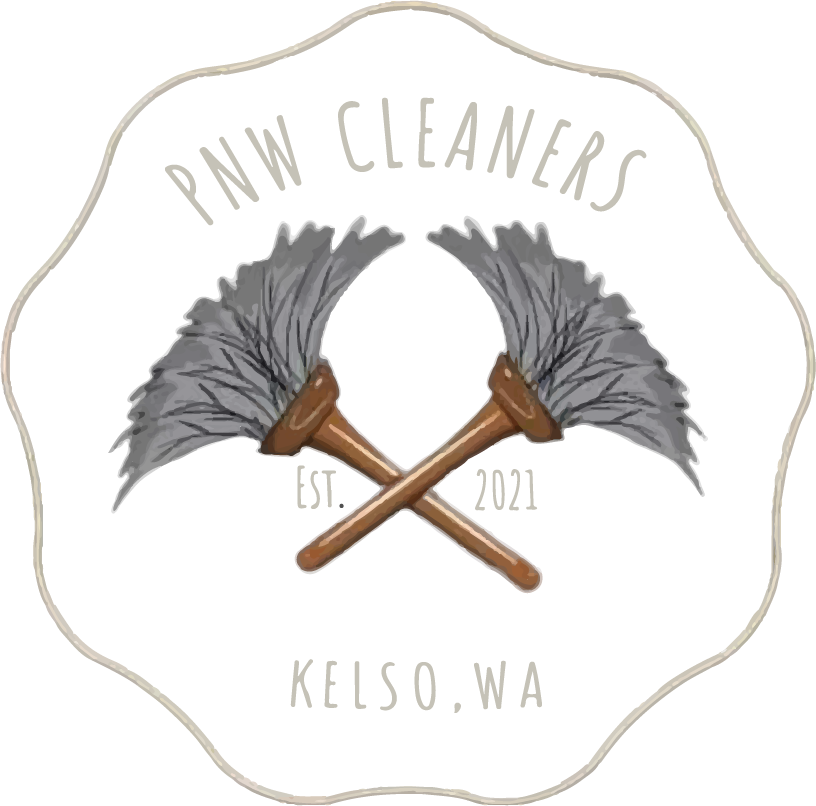Just as you’re considering a more eco-friendly and cost-effective approach to cleaning, we’re here exploring the eight best homemade cleaning products for your home. You can’t deny the appeal of a fresh, clean house, but have you ever thought about what’s in those store-bought cleaners? They’re often full of harsh chemicals that can be dangerous for your family and the environment. But don’t fret; there’s a safer, more natural solution right in your pantry. Curious about what these ingredients are and how they can transform your home? We’ll get to that, but first, let’s discuss why making the switch is a smart move.
Key Takeaways
- Homemade cleaning products are an eco-friendly and safer alternative to store-bought cleaners.
- Using homemade cleaning products is a cost-effective cleaning solution and reduces waste and plastic packaging.
- Homemade all-purpose cleaners can be made using simple ingredients like lemon peels and vinegar.
- Baking soda is a versatile cleaner that can be used for deodorizing, scrubbing surfaces, and removing grease and stains.
Lemon Vinegar Cleaner: Recipe and Use
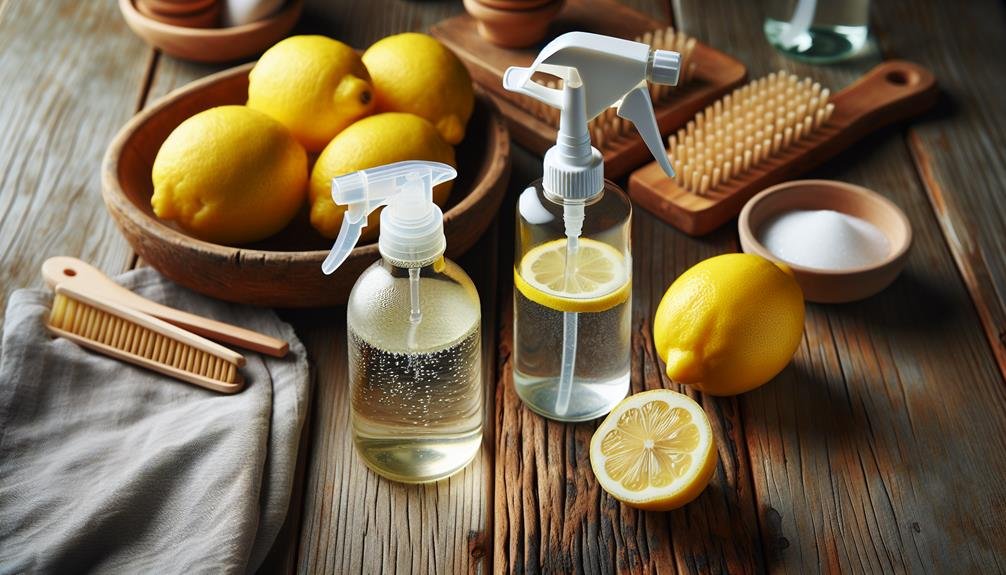
Harnessing the natural cleaning power of citrus and vinegar, you can easily whip up a batch of homemade lemon vinegar cleaner, providing an effective, inexpensive, and eco-friendly solution for your household chores. Here’s how you do it:
First, you’ll need two simple ingredients: the peels of two lemons and a cup of white vinegar. Don’t toss those peels after squeezing the juice for your recipe or drink; they’re essential for this cleaner. Next, find a clean jar that can comfortably hold your peels and vinegar.
Place the peels in the jar, then pour the vinegar over them until they’re completely submerged. This is your cleaner base. Now, you’ve got to wait for the magic to happen. Cover the jar and let it sit for two weeks. This waiting period allows the vinegar to infuse with the lemon peels, extracting the oils and creating a powerful cleaning agent.
After two weeks, strain the vinegar into a spray bottle, leaving out the lemon peels. There you’ve got it—your homemade lemon vinegar cleaner!
Now, how do you use it? You can use it just like you’d use a store-bought all-purpose cleaner. It’s great for wiping down countertops, cleaning grime off of appliances, and even tackling bathroom dirt. But remember, like other cleaners, always do a test patch first to ensure it won’t discolor or damage the surface.
With this homemade cleaner, you’re not just saving money; you’re also reducing waste and avoiding harsh chemicals. Happy cleaning!
Baking Soda: A Versatile Cleaner
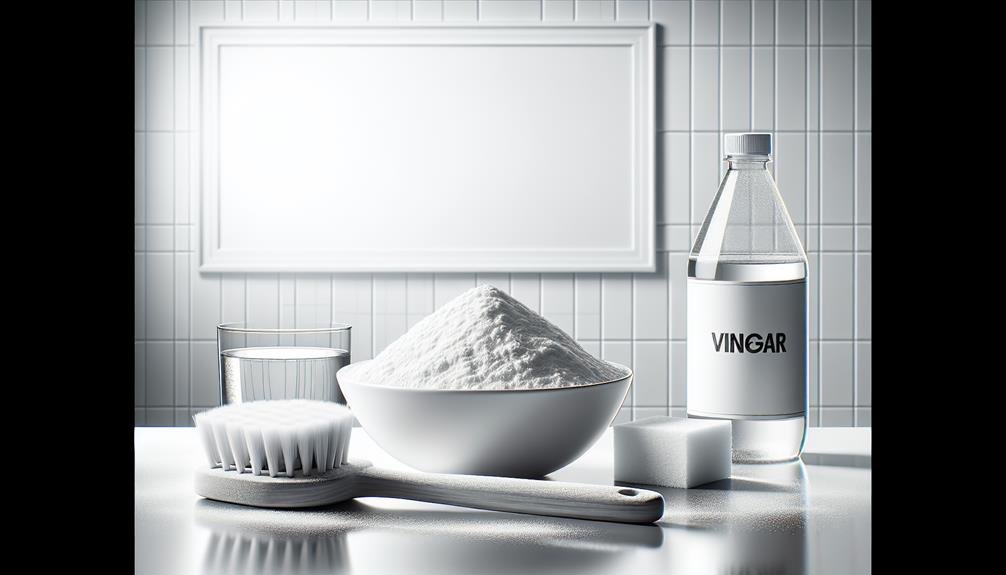
Shifting gears, let’s dive into the world of baking soda, a household staple that’s more than just a leavening agent for your baked goods—it’s also a versatile cleaning powerhouse. This white powdery substance can be your best ally in maintaining a clean and fresh home without breaking the bank or harming the environment.
You might be wondering, How can you use baking soda for cleaning? Well, it’s actually quite simple. For a start, it’s an excellent deodorizer. You can sprinkle it in your trash can to neutralize any unpleasant smells. It also works wonders in your fridge and freezer. Simply place an open box or a small bowl of baking soda inside to absorb food odors.
Baking soda’s prowess doesn’t stop there. It’s also a gentle abrasive, perfect for scrubbing surfaces without causing damage. Your kitchen sink, stovetop, and bathroom tiles can sparkle with a paste made from baking soda and a little water. Just apply, scrub gently, and rinse off.
And remember those pesky grease and food stains on your pots and pans? Baking soda can tackle those too. Make a paste, apply it to the stained area, let it sit for a few minutes, then scrub away.
Lastly, let’s not forget its role in laundry. Adding half a cup of baking soda to your washing machine can brighten your clothes and remove tough odors.
Homemade Glass Cleaner: Step-by-Step Guide
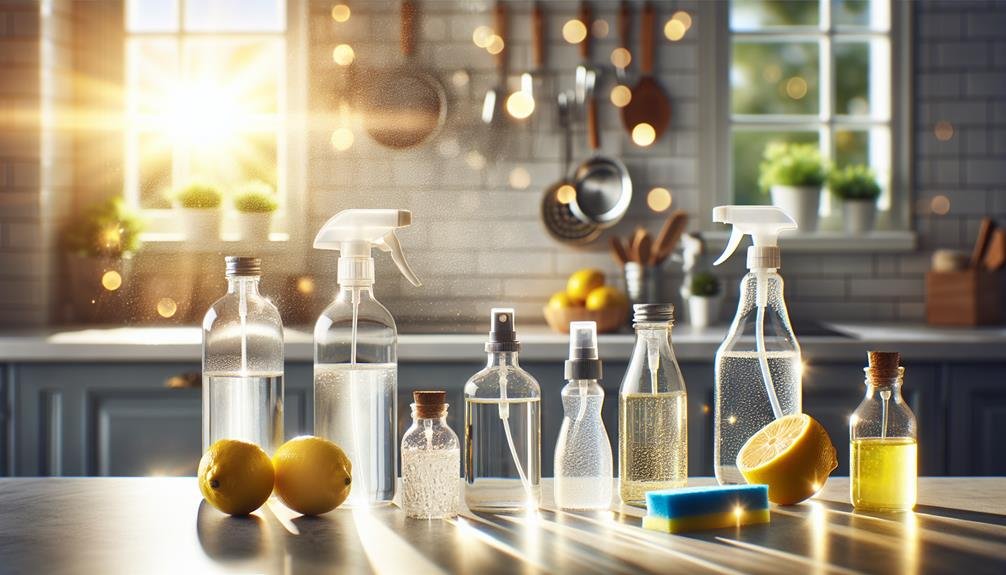
Let’s roll up our sleeves and make some homemade glass cleaner. You’ll be amazed at how simple the preparation is, using ingredients you likely have on hand. Once mixed, we’ll discuss how to apply it properly for the best shine and effectiveness.
Ingredients and Preparation
To whip up your own homemade glass cleaner, you’ll need just a few readily available ingredients and a bit of time. This cleaner is not only cost-effective but also eco-friendly, making it a great choice for your home.
Here’s what you’ll need:
- 2 cups of water
- 1/2 cup of white or cider vinegar
- 1/4 cup of 70% concentration rubbing alcohol
- 1 to 2 drops of essential oil for smell (optional)
Start by taking a clean spray bottle. Pour in the water, vinegar, and rubbing alcohol. If you’d like your cleaner to have a pleasant scent, add the essential oil. Screw the top back on the bottle and shake it to mix the ingredients. Now, you’ve got your homemade glass cleaner ready for use!
Application and Effectiveness
Wondering how to use this homemade glass cleaner effectively? It’s simple. Start by shaking the bottle to mix the ingredients well. Then, spray a sufficient amount on the glass surface you want to clean. Don’t overdo it; a light mist is enough. Use a soft microfiber cloth or newspaper to wipe the surface. Wipe in a circular motion to avoid streaks.
Your homemade glass cleaner is not just economical; it’s also highly efficient. You’ll see that it leaves your windows and mirrors sparkling clean without any residual streaks or spots. Remember, it’s important to wipe the surface dry to maximize effectiveness. With this cleaner, you’re not just saving money; you’re also ensuring a safer environment for your family.
DIY Natural Laundry Detergent
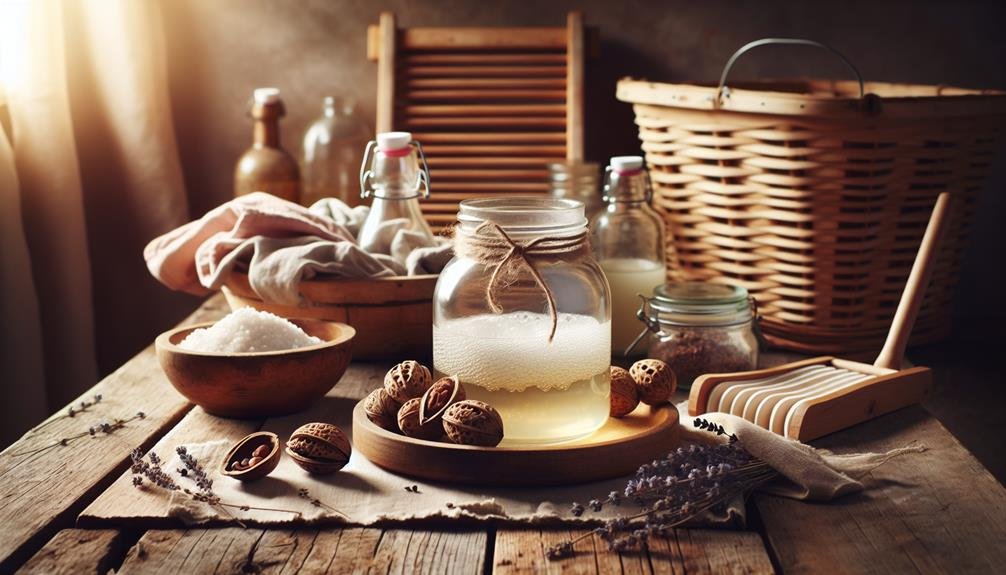
Now, let’s talk about making your own natural laundry detergent. You’ll learn how to choose the right ingredients, follow a step-by-step guide to create your mixture, and understand its benefits and efficiency. It’s easier than you think, and the rewards are well worth it.
Choosing Your Ingredients
In crafting your very own DIY natural laundry detergent, it’s vital to select the right ingredients that not only clean your clothes effectively but are also safe for your skin and the environment. It’s all about using things that are natural, biodegradable, and non-toxic.
Here are a few essential ingredients for your homemade detergent:
- Borax: This natural mineral boosts cleaning power and helps remove stains.
- Washing Soda: Not to be confused with baking soda, washing soda helps to remove odors and dirt.
- Bar Soap: Natural, unscented bar soap is a great base for your detergent.
Step-by-Step Preparation
Having gathered your borax, washing soda, and unscented bar soap, let’s embark on the process of creating your homemade natural laundry detergent. The process is straightforward and won’t eat up much of your time.
| Steps | Ingredients | Instructions |
|---|---|---|
| 1 | Unscented Bar Soap | Grate the soap using a cheese grater. |
| 2 | Borax and Washing Soda | Mix the grated soap with 1 cup of borax and 1 cup of washing soda. |
| 3 | – | Stir until well combined. |
| 4 | – | Store your detergent in an airtight container. |
Benefits and Efficiency
While you’re enjoying the simplicity of making your own laundry detergent, you’ll also appreciate the numerous benefits and the impressive efficiency of this DIY natural cleaning product.
- Cost-effective: You’re reducing your expenses by creating a reliable product at home.
- Environmentally friendly: You’re contributing to a healthier planet by using natural, biodegradable ingredients.
- Skin-friendly: Your homemade detergent won’t contain harsh chemicals, making it gentler on your skin.
The efficiency of your DIY detergent can rival and often surpass that of commercial products. You’ll find your clothes thoroughly cleaned, smelling fresh, and free of irritating residues. This practical solution is a testament to the benefits of homemade cleaning products. So, enjoy the peace of mind and satisfaction that come from creating an effective, natural product for your home.
Creating Your Own Dish Soap
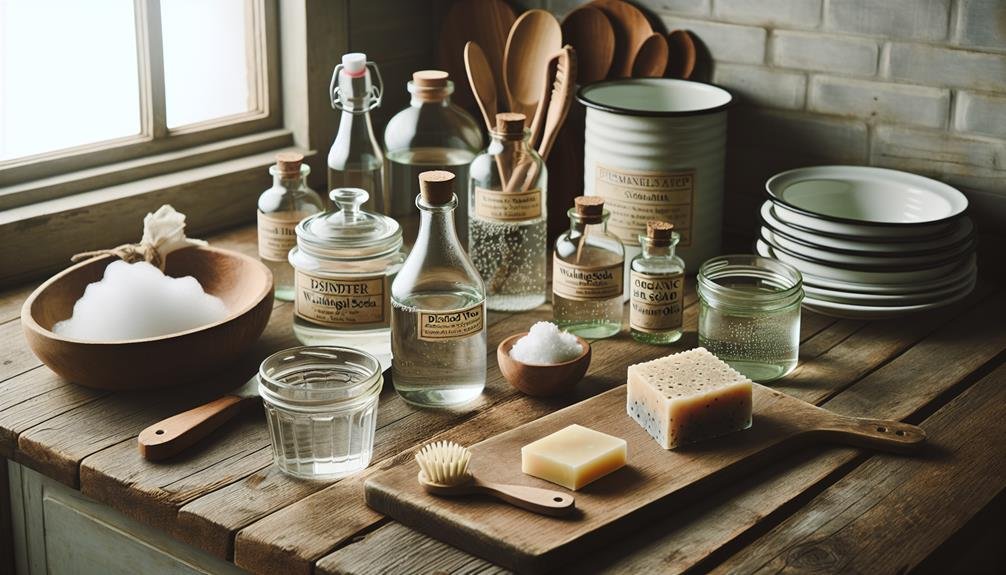
Ditching store-bought detergents, you’ll find it’s easier than you think to whip up your own effective, eco-friendly dish soap at home. All you need are a few simple ingredients: distilled water, a bar of unscented castile soap, washing soda, and your favorite essential oil for a pleasant scent.
First, grate a bar of castile soap. You’ll need about a cup’s worth for this recipe. Next, bring four cups of distilled water to a boil. Add the grated soap and stir until it’s completely dissolved. Then, mix in a tablespoon of washing soda. This ingredient will boost cleaning power and help cut through grease.
Remove the mixture from the heat and let it cool. As it cools, it’ll thicken into a gel-like consistency. Don’t worry if it seems too thick; you can always add more water later. Once it’s cool, add in 10–15 drops of your chosen essential oil. Lavender, lemon, and tea tree are all great options that add a fresh, clean scent to your homemade dish soap. Stir well to ensure the oil is evenly distributed.
Pour your homemade soap into a reusable soap dispenser, and voila! You’ve got a cost-effective, eco-friendly dish soap that’ll make your dishes sparkle. This is not just a fun do-it-yourself project but also a small step towards a more sustainable lifestyle. Plus, you’ll know exactly what’s going into your cleaning products, giving you peace of mind for your and your family’s health. Experiment with different essential oils to find your perfect blend. Homemade dish soap: it’s easier and more rewarding than you might think.
Homemade Carpet Stain Remover
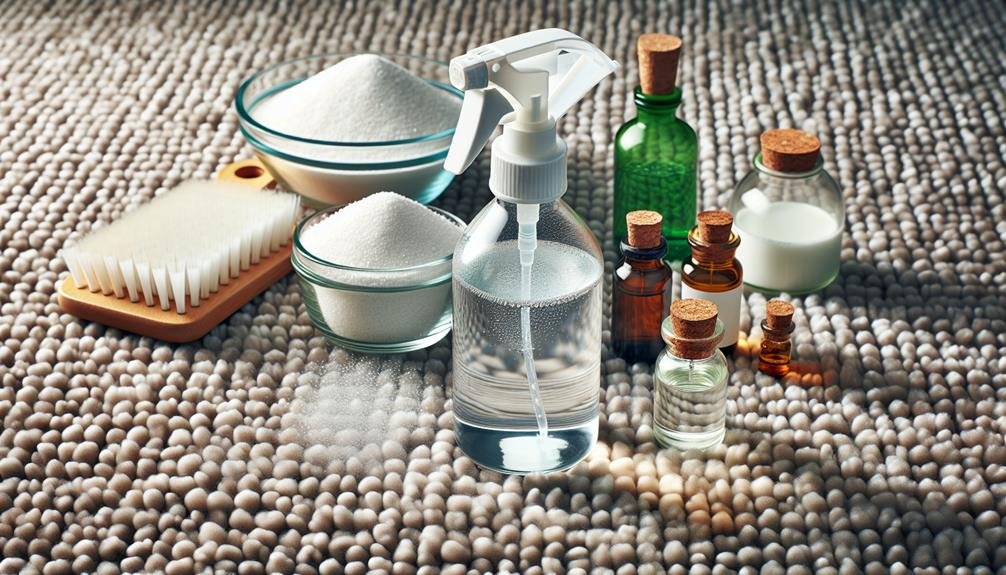
Next up, let’s tackle those stubborn carpet stains with a homemade remover that’s just as effective as store-bought versions. You’ll be amazed by how easy it is to get your carpets looking brand new with just a couple of everyday household items.
First, let’s gather everything you’ll need:
- White vinegar
- Baking soda
- Water
These three simple ingredients will be your secret weapon against stubborn carpet stains. Now, let’s get to work!
First, mix equal parts of white vinegar and water in a spray bottle. This is your stain-fighting solution. Next, sprinkle the stained area with a generous amount of baking soda. Don’t be shy; the more, the better!
Now, spray your vinegar solution over the baking soda. You’ll immediately see it start to fizz and bubble. This is the magic happening right before your eyes! The vinegar and baking soda are reacting, working to break down the stain.
Leave the mixture to do its job for at least 15 minutes. For really stubborn stains, you might want to leave it for a couple of hours or even overnight. Then, simply vacuum up the dried mixture. You should see the stain lift right up with it.
Remember, it’s always a good idea to do a patch test on an inconspicuous area of your carpet first. This way, you’ll know the solution won’t bleach or discolor your carpet.
There you have it! A homemade carpet stain remover that’s easy to make, effective, and won’t break the bank. Say goodbye to those stubborn carpet stains for good!
Effective DIY Grout Cleaner
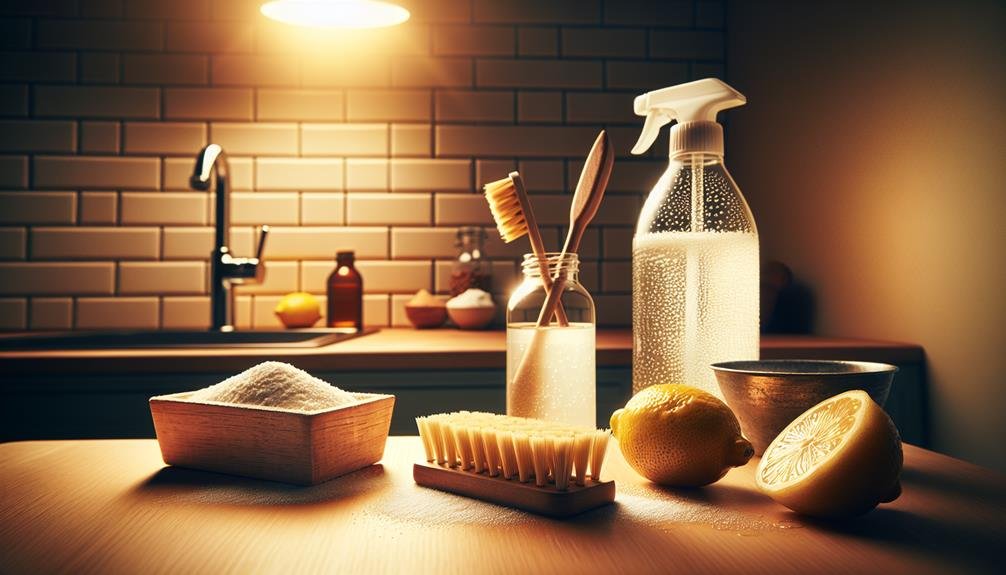
Just as you can handle carpet stains with homemade solutions, so too can you tackle grimy grout lines in your home. With simple ingredients from your pantry and a bit of elbow grease, you can create an effective DIY grout cleaner that’ll make your tiles sparkle.
| Ingredient | Quantity | Purpose |
|---|---|---|
| Baking Soda | 1/2 cup | Acts as a gentle abrasive |
| Hydrogen Peroxide | 1/4 cup | Whitens and disinfects |
| Liquid Dish Soap | 1/4 cup | Breaks down grime |
Mix these ingredients together to form a thick, paste-like consistency. This homemade cleaner is not only effective but also safe for your tiles and grout, unlike some commercial cleaners that can be too harsh.
Apply the mixture to the grout lines using an old toothbrush or a grout brush. Scrub it well and allow it to sit for 5–10 minutes before rinsing with warm water. For stubborn stains, you might need to repeat the process.
Remember to test a small, hidden area first to ensure your homemade cleaner doesn’t discolor your grout. Also, always wear gloves to protect your hands from the hydrogen peroxide.
Finally, once your grout is clean, consider applying a grout sealer to protect it from future stains. This step isn’t mandatory, but it’s good practice to prolong the life of your grout.
Whether it’s in the bathroom or the kitchen, this DIY grout cleaner is a handy tool to have in your cleaning arsenal. With a bit of time and effort, you can make your home shine with ingredients you likely already have.
Natural Air Fresheners: Make It at Home

Often, you’ll find that creating your own natural air fresheners at home is not only a cost-effective solution, but it also allows you to customize scents according to your preferences while avoiding the harsh chemicals found in store-bought versions. Making your air fresheners is surprisingly easy, and it’s a quick, fun project that can turn your house into a fragrant paradise.
Here are just a few simple recipes to get you started:
- Baking Soda and Essential Oils Freshener: You’ll just need a small jar, baking soda, and your favorite essential oils. Fill the jar about 3/4 full with baking soda, then add 5–6 drops of your chosen essential oil. Give it a good shake and leave the jar open where you want the scent to be dispersed.
- Citrus and Herb Simmering Potpourri: This one’s as easy as slicing a lemon and an orange, throwing them into a pot of water with a few sprigs of rosemary or thyme, and letting the mixture simmer on the stove. The steam will carry the scent throughout your home.
- Vodka and Essential Oils Spray: Mix water, a couple tablespoons of vodka, and about 20 drops of essential oils in a spray bottle. The vodka helps the water and oils mix and will evaporate, leaving only the scent behind.
Frequently Asked Questions
How Can I Make a Homemade Cleaner That Is Safe for Pets?
You can make a pet-safe cleaner by mixing equal parts white vinegar and water. Add a few drops of essential oil for scent. It’s non-toxic, effective, and won’t harm your furry friends.
Are There Any Homemade Cleaning Products That Can Be Used for Metal Surfaces?
Yes, there are. You can mix equal parts vinegar and water to create a natural cleaner for metal surfaces. It’s safe, effective, and won’t scratch or tarnish most metals. Always do a spot test first.
Can Homemade Cleaners Effectively Kill Bacteria and Viruses?
Yes, they can. When you’re making homemade cleaners, using ingredients like vinegar and tea tree oil can effectively kill bacteria and viruses. However, it’s crucial to use them correctly for optimal results.
Are There Any Homemade Cleaning Products That Can Be Used for Wooden Furniture?
Yes, you can make a safe cleaner for your wooden furniture. Combine 1 cup of water, 1/4 cup of white vinegar, and a couple drops of olive oil. It’ll clean and polish without damaging the wood.
Can I Combine Different Homemade Cleaning Product Recipes for a More Potent Solution?
Sure, you can mix different homemade recipes, but be cautious. Some combinations may cause harmful reactions. It’s best to stick to one effective recipe or thoroughly research before combining any household ingredients for cleaning purposes.
Conclusion
You’ve now got the scoop on eight top homemade cleaning products. From the zesty lemon vinegar cleaner to the versatile wonders of baking soda, you’re ready to tackle any mess. Whether it’s sparkling glass, fresh laundry, clean dishes, stain-free carpets, grime-free grout, or a fresh-smelling home, you’re covered. So, why not roll up your sleeves and give these DIY cleaners a try? They’re practical, eco-friendly, and, above all, effective. Happy cleaning!
